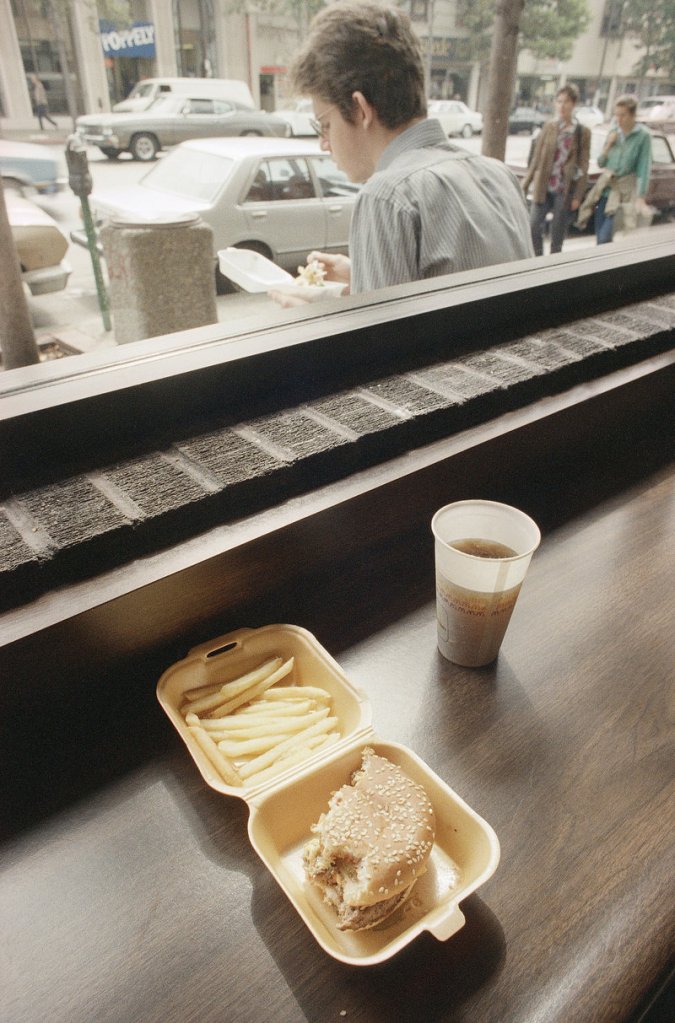Barely 24 hours have passed since Mayor Michael Bloomberg proposed an all-out ban on plastic foam food containers in the city and already New Yorkers are asking: So what do we use instead?
Bloomberg’s announcement, made Thursday in his State of the City address, left consumers and food vendors big and small wondering what a city free of plastic foam might look like.
Polystyrene foam containers have long been used by street vendors and take-out restaurants as a cheap way to keep in the heat — and sauces — of meals sold to on-the-go customers.
“If they ban it all, we’ll have to use aluminum storage containers,” said Paul Gopaul, 29, owner of the popular Midtown food truck Faith’s Halal Food. “Definitely we’d have a price change.”
Gopaul estimated he uses 500 plastic foam food containers a week, which he buys in packs of 175 containers that sell for $15 at a Queens supplier. The aluminum containers of equal size run about $5 more per pack, he said.
“Right now it’s a lot of regulations, but if that’s what it takes to keep us out here, then we got to do it,” he said.
The mayor’s proposal is not an original idea. A number of cities on the West Coast have enacted such legislation, including San Francisco. Some states have partial or industry-specific bans of the material’s use. In Maine, for example, bait can’t be sold in polystyrene foam plastic.
In Seattle, the City Council enacted a plastic foam containers ban and the response there has been largely muted.
Although commonly referred to as Styrofoam, that brand of polystyrene foam isn’t used in food packaging, according to its manufacturer, Dow Chemical Co.
Plastic foam cups that keep drinks hot would also be on the chopping block if Bloomberg’s citywide ban becomes law. That means Dunkin’ Donuts, which has about 480 store locations throughout the five boroughs, would be in a bind. The company said it does have stores in four U.S. cities that have implemented a polystyrene ban but uses paper cups in those stores.
“A polystyrene ban will not eliminate waste or increase recycling; It will simply replace one type of trash with another,” Dunkin’ Donuts said in a statement.
Avid Dunkin’ Donuts coffee drinker Charles Smith said he’s sympathetic to the environmental concerns of polystyrene foam, but Bloomberg’s latest initiative misses the point.
“I think there are a lot of things in New York that are bad for the environment, like cars and buses,” said Smith, 45, who works in the security field. “True New Yorkers just want their coffee.”
The proposed plastic foam ban is the latest in a series of public health initiatives launched by the mayor in his 11-year tenure. Others include banning trans fats from restaurant meals, forcing chain eateries to post calorie counts on menus and limiting the size of some sugary drinks.
Bloomberg, speaking Friday morning on John Gambling’s WOR radio show, touted both the environmental and economic benefits of banning polystyrene foam.
“Styrofoam, or polystyrene, does not degrade with time. It’s just there forever,” he said. “And it’s not good for you, and it costs us a lot of money. And the stores — most stores have already gone away from it.”
Other food containers made from certain types of plastics and paper products are recyclable and already widely used, a mayor’s spokeswoman added.
But industry groups were wary of any proposed ban.
“Polystyrene foam food-service products are two to five times less expensive than alternatives, which saves the city’s agencies a significant amount of tax dollars,” the trade group American Chemistry Council said.
The mayor’s proposal would have to be drafted into legislation and passed by the City Council before becoming law.
City Council Speaker Christine Quinn supports it. But a similar proposal has stalled in the City Council in recent years.
Industry groups have already begun to prepare for a bill to surface.
“As the legislative process moves forward, we hope that all parties listen to small businesses like restaurants and take into account how it’ll affect them,” said Andrew Moesel, spokesman for the city restaurant association.
Marina Pena, 40, a school counselor from Washington Heights, said she’d prefer to be more eco-friendly, but it’s not her decision.
“If I had an option, I’d bring my own containers or get it served on something else, but this is all they give you,” said Pena, who bought lunch served in a plastic foam container from a midtown Manhattan food cart. “I know it’s bad for the environment. I know you can’t recycle it.”
Fish Yu, a part-time manager of the popular Chinese restaurant Ollie’s on 42nd Street, said his restaurant uses at least 150 plastic foam containers a day.
He said being forced to use alternatives to plastic foam would likely be more expensive.
“If they say so, we’ll have to charge it to the customers,” he said.
Send questions/comments to the editors.



Success. Please wait for the page to reload. If the page does not reload within 5 seconds, please refresh the page.
Enter your email and password to access comments.
Hi, to comment on stories you must . This profile is in addition to your subscription and website login.
Already have a commenting profile? .
Invalid username/password.
Please check your email to confirm and complete your registration.
Only subscribers are eligible to post comments. Please subscribe or login first for digital access. Here’s why.
Use the form below to reset your password. When you've submitted your account email, we will send an email with a reset code.